“Aware of the ongoing maneuvers, Kolvenbach, acting in contrast to his usual discreet and serene style, asked Benedict XVI for an audience and, in a firm and determined manner, as perhaps never in his life, asked him not to approve a decision of this type, which the Society this time would not tolerate.”—Gianni La Bella, the spokesman for the Community of Sant’Egidio for Latin America, in his new history of the Jesuit order during the past 50 years entitled The Jesuits: From Vatican II to Pope Francis, presented in its original Spanish edition in Rome two days ago. La Bella was referring to the reaction of Father Peter-Hans Kolvenbach, the Superior General of the Jesuits for 25 years, from 1983 until 2008, at the time just before his retirement (the 2006-2007 period), when he learned that Cardinal Tarcisio Bertone, Vatican Secretary of State, wished to skip the election of a new Superior General, and rather to impose a “commissioner” — or “pontifical delegate” — on the order who would be none other than… the Cardinal Archbishop of Buenos Aires, Jorge Mario Bergoglio…
“If Bergoglio would have accepted and carried out that task — to become the “Commissioner” of the Jesuit order, chosen by Bertone and Pope Benedict — whole-heartedly and effectively, one might reasonably imagine that Pope Benedict XVI, receiving considerably more support from the Jesuits than he did receive, and experiencing considerably less friction in his relations with the Jesuits, might never have had reason to resign, and might not have resigned.” —Dr. Robert Moynihan, in this Letter below
The Jesuits in 2007: A “Second Dezza”?
By Dr. Robert Moynihan
In 2007, according to the author of a new book on the Jesuits in the past half-century, the Vatican Secretary of State under Pope Benedict XVI, Cardinal Tarcisio Bertone, developed a plan to install then-Archbishop of Buenos Aires Jorge Mario Bergoglio (elected Pope Francis in 2013) as the Vatican-appointed “head” of the Jesuit order, “short-circuiting” the Jesuits’ own normal process of electing their own head upon the retirement of their Superior, then Dutch General Fr. Peter-Hans Kolvenbach.
The plan was never implemented.
Kolvenbach went directly to Pope Benedict and pleaded with him not to do it.
Meanwhile, for his part, Bergoglio allegedly expressed his unwillingness to take on the role.
All this according to a new book on recent Jesuit history, written in Spanish, presented in Rome two days ago on January 21… 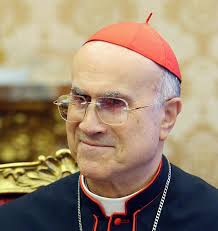
Cardinal Tarcisio Bertone (right) and, allegedly, Pope Emeritus Benedict XVI, during 2006 and 2007, developed a plan to impose an administrator on the Jesuit order.
And the man they wanted to take over as “Rome’s man” in running the Jesuits was… Jorge Mario Bergoglio, then archbishop of Buenos Aires, now Pope Francis. But the Jesuits opposed the plan, and Bergoglio himself said he would not accept the task…
So says a new book presented two days ago in Rome…
Note: If you would like to become a sponsor of these letters, which would be very helpful in these interesting times, please click here. A monthly donation, even if very small, is very much appreciated. – RM
Here is the cover of the new book on the Jesuits presented in Rome on January 21. Below is the press conference in Rome to present the book two days ago, on January 21, 2020. Bottom, Father Peter-Hans Kolvenbach with Pope Benedict XVI. Kolvenbach allegedly pleaded with Benedict not to impose a “pontifical delegate” as head of the Jesuit order, but to allow the Jesuits to vote for his successor
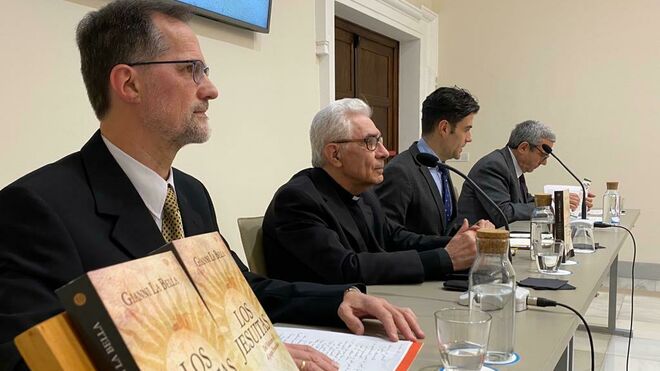
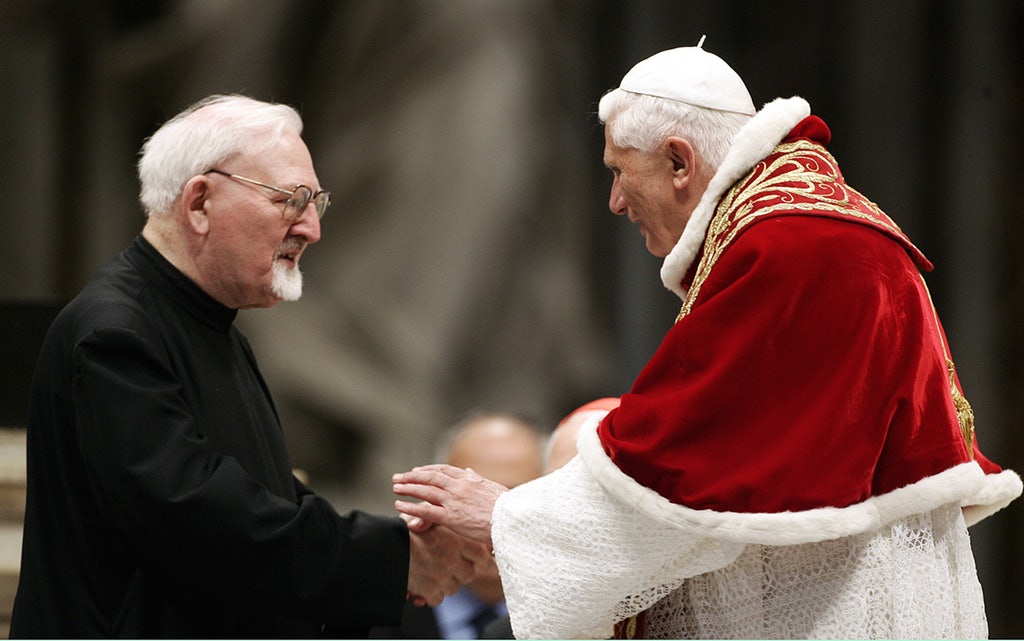
Father Peter-Hans Kolvenbach and Pope Benedict
The website GloriaTV (link) summarizes the story this way:
Vatican Wanted “Conservative” Bergoglio as Jesuit Commissioner
Benedict XVI’s Secretary of State, Cardinal Tarcisio Bertone, thought in 2006-2007 of imposing a commissioner on the decadent Jesuits.
This was said during the presentation of the Spanish version of Gianni La Bella’s “The Jesuits. From Vatican II to Pope Francis.”
A foolish Bertone had in mind to appoint Buenos Aires Cardinal Bergoglio for the job. He informed Jesuit general Kolvenbach who had presented his resignation. Kolvenbach — no friend of Bergoglio — was “perplexed and disconcerted.”
He asked for an audience with Benedict XVI informing him that the Jesuits “would not tolerate” Bergoglio as a commissioner.
Bergoglio also knew this. He refused to accept the job.
Here is the original story in Spanish, published on religiondigital.org, “Bergoglio ‘se opuso tenazmente’ a que Bertone y Ratzinger volvieran a intervenir a la Compañía en 2007,” (link) on the presentation of the book in Rome on Tuesday, January 21.
And here is an English-language translation of that Spanish story, prepared by my son, Christopher Hart-Moynihan, a linguist.
Bergoglio “Doggedly Opposed” Bertone and Ratzinger’s Takeover of the Society of Jesus in 2007
The historian Gianni La Bella reveals this in his ‘Los jesuitas’ (Mensajero)
The present Pope [i.e., Francis] avoided, with his refusal to participate in the plan, a new “commissioning” of the Jesuits in 2006-2007, taking advantage of Kolvenbach’s retirement, “which the Company this time [Translator’s note: i.e., referring to an earlier “commissioning” of the Society upon the retirement of Fr. Pedro Arrupe in the early 1980s] would not have tolerated”
January 21, 2020
By Jesús Bastante
The surprise — and what a surprise! — came just at the beginning of the presentation of The Jesuits: From Vatican II to Pope Francis by Gianni La Bella, published by Messenger. The editorial director of the Loyola Communications Group, Ramón Alfonso, divulged one of the book’s major revelations. A bombshell: Bertone wanted once again to take over the running of the Jesuits, taking advantage of Kolvenbach’s resignation and thought of Bergoglio(!) to be the administrator. But the archbishop of Buenos Aires “doggedly refused.”
So the book tells the story. In 2006-2007, the Vatican Secretary of State, Tarcisio Bertone, was considering a new direct intervention in the running of the Society of Jesus, just a quarter of a century after the traumatic decision that separated Father Arrupe from the Generalate. Bertone approached the General at the time, Father Kolvenbach (who had submitted his resignation), with the idea that the archbishop of Buenos Aires, Jorge Mario Bergoglio, could step in as the administrator (comisario, “commissioner”) for this new phase.
Benedict XVI “would certainly have had no objection,” explains La Bella in his book. “Kolvenbach, perplexed and bewildered,” contacted Bergoglio, who, despite not agreeing with all of the decisions and positions taken by the government of the order, “was decidedly opposed to the idea of a papal intervention, which would multiply the problems instead of solving them.”
Bergoglio said “no” to Benedict XVI
Kolvenbach’s successor, Fr. Adolfo Nicolás, revealed this story to a group of Jesuits in 2013, shortly after Francis’s election.
“In his first meeting with Francis, [Francis] told [Nicolás] that he had made clear before Pope Benedict his staunch opposition to the proposal of a new takeover of the Society, which certain people in Rome wanted to carry out at that time,” reveals La Bella from direct sources.
Kolvenbach stands firm before the Pope
“Aware of the ongoing maneuvers, Kolvenbach, acting in contrast to his usual discreet and serene style, asked Benedict XVI for an audience and, in a firm and determined manner, as perhaps never in his life, asked him not to approve a decision of this type, which the Society this time would not tolerate.”
In the end, there was no intervention, and the General Congregation elected Father Nicolás Superior General of the Society. The rest is history.
This revelation of Alfonso overshadowed the entire presentation of the book, at which were also present the Jesuit Elías Royón in addition to the author and the moderator, the journalist José Beltrán. For La Bella, who dedicated his book to the recently deceased Father Urbano Valero, the real “news” of the book concerns Fr. [Pedro] Arrupe, the fact that “Fr. Arrupe was not only a prophet but one of the most important figures of Catholicism of the 20th century.”
The Jesuits, the great protagonists of the Council
“The Jesuits were the great protagonists of the Second Vatican Council,” said the author of the book, who insisted that the Jesuits “are a very tangled forest, and Arrupe tried to understand that forest.” He added: “From Arrupe to Father [Arturo] Sosa [Translator’s note: the present head of the Jesuits], the Society transitioned from a Eurocentric idea of its mission to a very profound cultural revolution.”
For his part, Royón defined Arrupe as “a mystic and a prophet, a man of planetary vision,” and valued the Generalates of Kolvenbach and Nicolás as part of a whole with the aim of “realizing the dreams of the Council.”
The Society continues its course, no matter how much Bertone — and perhaps Ratzinger [i.e., Pope Benedict XVI] — wanted to check it, as John Paul II, in his time, did as well. Now, the Jesuits are, more than ever, the “army of the Pope.” Francis himself, La Bella confessed, has officially asked the Jesuits for support; they are doing their utmost in this pontificate, especially now that the restorationist storm is coming. (translation from the original Spanish by Christopher Hart-Moynihan)
Just speculating
Of course, it is fascinating to speculate, based on this reconstruction by La Bella, what would have happened if this proposal of Bertone had been accepted and executed.
Archbishop Bergoglio would have become the chief administrator of the Jesuits already in about 2007.
Would he have retained the title of archbishop of Buenos Aires? Probably not.
He probably would have moved to Rome, into the Curia Generalizia of the Jesuits next to the Church of Santo Spirito in Sassia, just a few steps from St. Peter’s Square.
And his job, naturally, would have been to guide the Jesuit order in a direction in keeping with… the thought and intention of Pope Benedict XVI.
If Bergoglio would have accepted and carried out that task — to become the “Commissioner” of the Jesuit order, chosen by Bertone and Pope Benedict — whole-heartedly and effectively, one might reasonably imagine that Pope Benedict XVI, receiving considerably more support from the Jesuits than he did receive, and experiencing considerably less friction in his relations with the Jesuits, might never have had reason to resign, and might not have resigned.
And, never having resigned, he would still be happily reigning today, in 2020, at the age of 92, with Cardinal Bergoglio acting as the “Black Pope” — the head of the Jesuit Order — at the age of 83…
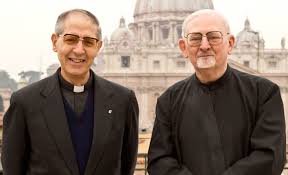
Two leaders of the Jesuits: left, Father Nicolàs and, right, his predecessor, Father Kolvenbach
Need Confirmation
Of course, this entire story would need to be confirmed by the protagonists.
Is what La Bella writes trustworthy?
Kolvenbach died in 2016.
The other main protagonists are still alive: Cardinal Bertone, Emeritus Pope Benedict, and Pope Francis.
A statement from one or more of these confirming or denying this story would be welcome in the interest of truth.
Below, a photo of Fr. Pedro Arrupe, head of the Jesuit order from the mid-1960s until the early 1980s. He was succeeded by Fr. Paolo Dezza as “Pontifical Delegate” in charge of the Jesuits, at the insistence of Pope John Paul II
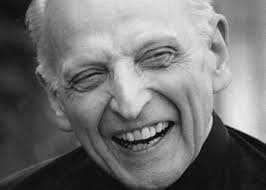
Some material on Father Kolvenbach, and (below) on Father Arrupe
Peter-Hans Kolvenbach
29th Superior General of the Society of Jesus (link)
Father Peter-Hans Kolvenbach was born on November 30, 1928, in Druten (Gelderland, Netherlands).
His parents were Gerard Kolvenbach (German) and Jacoba Domensino (Italian).
He came to know the Society of Jesus through his secondary studies at Canisius Colle (sic)and after a year of studying Latin and Greek, he entered the novitiate at Grave on September 7, 1948.
He pronounced first vows on September 8, 1950.
After a year of juniorate at Grave and three years of philosophy at the Berchmans Institute of Nijmegen, he was sent to Lebanon in 1958.
From the start of his new assignment, he dedicated himself to the study of Arabic through direct contact with people. In his new mission in the Near East, he specialized in the Armenian language and literature. He studied at St. Joseph’s University in Beirut for four years.
The Vicar Apostolic of Beirut, Eustace John Smith, OFM, ordained him a priest in the Armenian Rite on June 29, 1961.
He continued to study philosophy and linguistics in Beirut and Paris. His final year of formation was in Cleveland in the USA, where he completed tertianship. He professed solemn vows on August 15, 1969.
At St. Joseph’s University in Beirut he was a professor of linguistics and Armenian language and literature (1968-1974). In 1974 he was named Vice-Provincial of the Near East. He took part in General Congregation 32 (1975).
In 1981 he was called to Rome as Rector of the Pontifical Oriental Institute.
He took part in General Congregation 33 as elector of the Vice-Province and elected Superior General on September 13, 1983. He convoked and presided over General Congregation 34 (1995).
During his long generalate he participated in many Synods of Bishops; he was a member of the Congregation for the Evangelization of Peoples, Congregation for Institutes of Consecrated Life, and Consultor for the Congregation for Oriental Churches.
General Congregation 35 accepted his resignation on January 14, 2008, and thanked him in the name of the entire Society for his generous service as Superior General. At the end of the Congregation, he returned to the Near East Province. In recent years he continued working on various themes related to his specialization in Armenian language and literature.
He died in Beirut on November 26, 2016, after a brief hospitalization.
© Society of Jesus 2020 – All rights reserved – Borgo S. Spirito, 4 – 00193 – ROME (Italy) Tel. +39-06-698681
On Father Arrupe’s resignation (link)
On 7 August 1981, the Jesuit’s Father General Pedro Arrupe suffered a severe stroke in the plane on his way back to Rome.
Although he survived for another 10 years, he wanted to step down as Superior General.
Though Arrupe proposed Jesuit Father Vincent O’Keefe of Fordham University as interim successor, Pope John Paul II intervened and named Paolo Dezza his delegate to lead the order for an interim period. (Below is a final piece on Dezza.)
Two years later John Paul II allowed the Jesuits to proceed in selecting their new leader.
Meeting in September 1983, the 33rd General Congregation of the Society of Jesus accepted the formal resignation of Father Arrupe and on the first ballot elected Father Kolvenbach to be the 29th Superior General of the Jesuits.
Kolvenbach took office at a time when the Jesuits’ “strongly pro-social justice and Church reform orientation was seen by critics as having made the Jesuits something akin to John Paul’s in-house opposition. …Over time, Kolvenbach was credited with having managed to win back the trust of John Paul II and his Vatican team, without alienating the more liberal members of the order.”(link and link)
On 2 February 2006, Kolvenbach informed the members of the Society of Jesus that he intended to step down in 2008, the year he would turn 80. As the Superior General is elected for life, Kolvenbach was only the second to resign the office.
The 35th General Congregation of the Society of Jesus convened on 5 January 2008 in Rome. On 14 January it accepted Kolvenbach’s resignation and elected Adolfo Nicolás as his successor.
A New York Times Obituary on Dezza from 21 Years Ago…
Here is an obituary from the New York Times, published 21 years ago, on Cardinal Paolo Dezza, who died at the end of 1999 at the age of 98.
If Bertone and Pope Benedict would have insisted on having Cardinal Bergoglio become the Commissioner of the Jesuit order after the resignation of Father Kolvenbach in 2008, the issues treated in this article on Dezza would have applied to Bergoglio — had he agreed to become a “second Dezza.”
Cardinal Paolo Dezza, 98; Guided the Jesuits
By Alessandra Stanley
December 22, 1999, Section C, Page 26 (link)
Cardinal Paolo Dezza, a traditional Jesuit scholar who was assigned by Pope John Paul II to rein in the religious order in the early 1980s, died in Rome on Friday. He was 98.
The Jesuits, formally the Society of Jesus, an order founded in the 16th century, grew politically divided in the social unrest of the 1960s and ’70s.
One of the first concerns of John Paul II’s papacy was ridding the Roman Catholic Church of Marxist-tinted ”liberation theology” movements in Latin America, of which Jesuits were often leading advocates.
Jesuits in the United States and Europe were also prominent in theological rifts with Rome.
In 1979 the newly elected pope warned a gathering of Jesuits that their order was ”causing confusion among the Christian people and anxieties to the church.”
In 1981, as the battle between conservatives and liberals in the Jesuits intensified, the order’s superior general, the Rev. Pedro Arrupe, suffered a stroke.
The Jesuits nominated the Rev. Vincent O’Keefe, an American liberal, to run the order until a successor could be found.
The pope instead appointed Father Dezza, who was known as a brilliant scholar and also a traditionalist, as a special pontifical delegate to serve as the Jesuits’ interim leader.
The pope had attended Father Dezza’s lectures when studying in Rome after World War II at the Gregorian Pontifical Institute, where Father Dezza was rector.
Father Dezza was also a confessor to Pope Paul VI and Pope John Paul I.
Despite the concerns of some Jesuits, his leadership proved deft.
In 1983 the Jesuits chose the Rev. Peter Hans Kolvenbach, a Dutch academic who had mainly worked in the Middle East, to be superior general, and tension between the Vatican and the Jesuits abated.
The pope elevated Father Dezza to cardinal in 1991, even though he was 89, nine years over the age limit to vote to elect a new pope.
Cardinal Dezza, who was born in Parma in 1901, began his training as a Jesuit in 1918, right after finishing high school.
Ordained in 1928, he was appointed rector of the Gregorian in 1941.
During World War II, he was credited with having hidden people wanted by the Nazis.
Before the pope asked him to be a pontifical delegate to the Jesuits, Father Dezza had held senior administrative positions in the order, including president of the commission of superior studies in 1974.










Facebook Comments